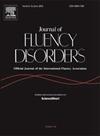More than meets the eye: Self-rated covert stuttering is linked to reduced psychosocial and communicative outcomes
IF 2.1
3区 医学
Q1 AUDIOLOGY & SPEECH-LANGUAGE PATHOLOGY
引用次数: 0
Abstract
Purpose
The purpose of this study was to investigate whether self-rated covert stuttering (i.e., the extent of being able to keep stuttering hidden from others) was associated with anxiety, quality of life, social role satisfaction, speech usage, and salience of stuttering among adults who stutter.
Methods
A sample of 316 adults who stutter was asked about the extent to which they believed they were successful in concealing their stuttering so that others did not know that they stuttered. The sample was divided into two groups, one comprised of people who believed they were more often than not overtly stuttering, and those who believed they were more covert. Groups were compared on variables of anxiety, quality of life, social role satisfaction, speech usage, and salience of stuttering, taking into account demographic and speech-related variables.
Results
There were significant correlations between level of self-rated covertness and all dependent variables. The group that reported being more covert reported significantly higher levels of stuttering salience, and significantly lower levels of quality of life, social role satisfaction, and speech usage compared to the less covert group, after taking into account demographic variables.
Conclusion
Focusing on stuttering visibility in therapy or research, without taking covert stuttering into account, may not optimize outcomes important psychosocial and communicative factors important to people who stutter. Taking into account the extent to which a person who stutters tries to hide their stuttering in assessment and treatment may help improve psychosocial and communicative outcomes, regardless of their physical speech disruption severity.
不仅仅是表面现象:自我评定的隐性口吃与社会心理和交流结果的降低有关
目的本研究的目的是调查自我评定的隐蔽性口吃(即能够对他人隐瞒口吃的程度)是否与口吃成人的焦虑、生活质量、社会角色满意度、语言使用和口吃的显著性有关。方法对316名口吃的成年人进行抽样调查,询问他们认为自己在多大程度上能够成功地隐藏自己的口吃,使别人不知道自己口吃。这些样本被分为两组,一组认为自己经常明显口吃,另一组认为自己更隐蔽。在考虑人口统计学和语言相关变量的情况下,对各组进行焦虑、生活质量、社会角色满意度、语言使用和口吃显著性等变量的比较。结果自评隐蔽性水平与各因变量均有显著相关。考虑到人口统计变量后,报告更隐蔽的小组报告的口吃显著更高,而生活质量、社会角色满意度和语言使用水平明显低于不那么隐蔽的小组。结论在治疗或研究中关注口吃的可见性,而不考虑隐性口吃,可能无法优化结果,这是对口吃者重要的重要社会心理和交际因素。考虑到口吃者在评估和治疗中试图隐藏口吃的程度,可能有助于改善社会心理和交流结果,而不管他们的肢体语言障碍的严重程度如何。
本文章由计算机程序翻译,如有差异,请以英文原文为准。
求助全文
约1分钟内获得全文
求助全文
来源期刊

Journal of Fluency Disorders
AUDIOLOGY & SPEECH-LANGUAGE PATHOLOGY-REHABILITATION
CiteScore
3.70
自引率
14.30%
发文量
23
审稿时长
>12 weeks
期刊介绍:
Journal of Fluency Disorders provides comprehensive coverage of clinical, experimental, and theoretical aspects of stuttering, including the latest remediation techniques. As the official journal of the International Fluency Association, the journal features full-length research and clinical reports; methodological, theoretical and philosophical articles; reviews; short communications and much more – all readily accessible and tailored to the needs of the professional.
 求助内容:
求助内容: 应助结果提醒方式:
应助结果提醒方式:


